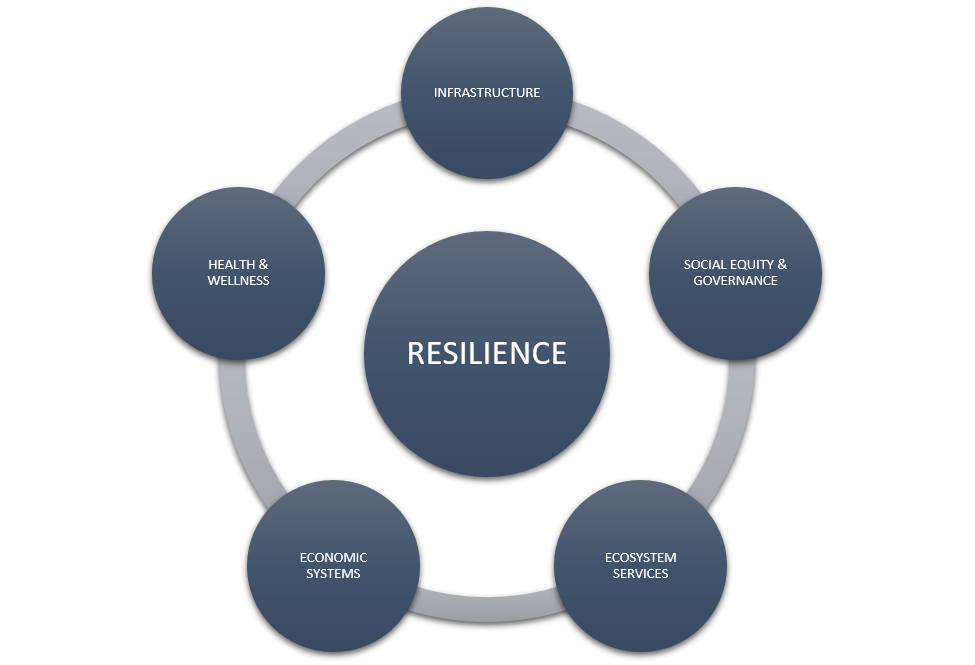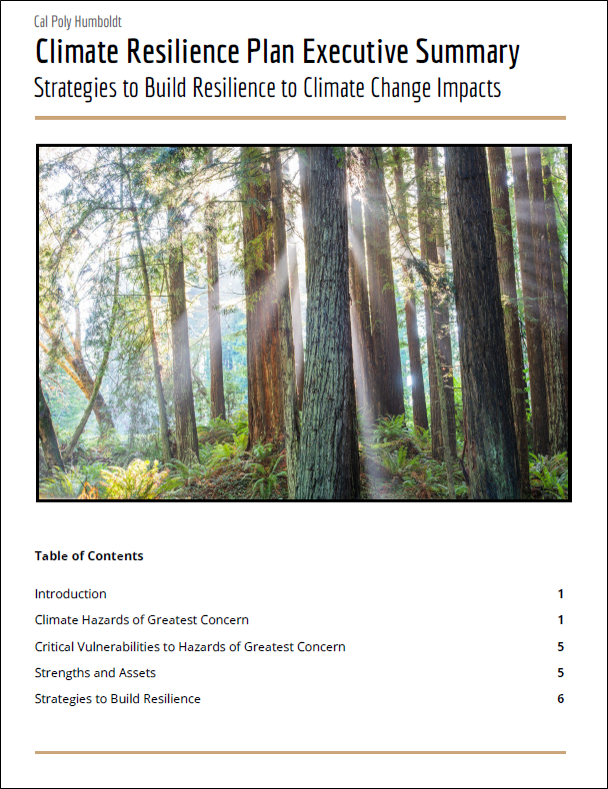Climate Change Resilience Initiatives
Our Changing Climate
Sea Level Rise. Flooding. Wildfires.
Our climate is changing and becoming more erratic, with impacts ranging from the disruptive to the catastrophic.
Building Resilience to Climate Change
Cal Poly Humboldt is committed to understanding and managing the impacts of climate change to our campus and within our community, and to preparing our students to be leaders in building resilient communities.
Climate change resilience can be defined as the capacity to prepare for changing conditions, to endure and recover rapidly from disruptions, and to adapt to climate change events, especially when those adaptation strategies substantially reduce greenhouse gas emissions. Planning for resiliency requires us to clearly define our vulnerabilities, as well as our strengths and assets that may support resilience. To do so, we take an intersectional approach that integrates the economic, social, and environmental dimensions of our campus and community.

The Intersectional Dimensions of Resilience
Cal Poly Humboldt Climate Resilience Plan
The university developed a Climate Resilience Plan as a section of the Climate Action Plan 2.0. Read the executive summary here. To see the full plan, see the CAP 2.0.
Other Climate Change Resilience Initiatives
Humboldt’s efforts to build a campus and community resilient to climate change are built upon three interrelated areas of focus - Planning, Curriculum & Research, and Student Leadership & Engagement - which allow us to more effectively plan for climate change while supporting others engaged in this important work. Here is what we are currently doing in these areas:
-
Planning:
- The Report on the Initial Assessment of Campus-Community Resilience, completed in April 2018, identifies vulnerabilities to climate change impacts, initial opportunities to strengthen resilience, and indicators the campus and City of Arcata can use to track progress towards greater resilience. Review the Initial Assessment of Campus-Community Resilience.
- Humboldt-Community Resilience Building Workshop (March 2019) brought together campus and community stakeholders to identify and prioritize actions to improve campus-community resilience. Review the Executive Summary and workshop Summary of Findings. More about the process used can be found at www.CommunityResilienceBuilding.org.
- Humboldt Resilience Action Plan (2022), integrated into Humboldt's Climate Action Plan.
-
Curriculum & Research:
- Continue work with Campus as a Living Lab (CALL) grantees, Integrated Curriculum Committee (ICC) and others to develop learning outcomes, assessment tools and Climate Change Resilience courses
- Continue to support students, faculty and researchers engaged in climate resilience work
-
Student Leadership & Engagement:
- Climate Resilience Deliberative Forum, presented by the CAHSS Deliberative Democracy Initiative & the Office of Sustainability
- Held in April 2019, the purpose of this event was to educate fifty student participants about efforts, on campus and in the local community, to collectively address and prepare for climate change-related hazards. This event also provided a forum for deliberation on community resilience, and for development of recommendations to strengthen resilience.
- Participants provided the Office of Sustainability and the City of Arcata Community Development Department with a diverse set of recommendations. Review the Climate Resilience Deliberative Forum Summary Report.
- Climate Resilience Deliberative Forum, presented by the CAHSS Deliberative Democracy Initiative & the Office of Sustainability
- Humboldt Student Leadership Institute For Climate Resilience (SLICR)
- Three-day immersive residential program (March 16-18, 2020) with service learning project
- The SLICR curriculum is designed to build knowledge, leadership skills, and agency to help create community resilience
- This "alternative spring break" program is offered as a 2-unit ENST 480 Special Topics course
- For more information, contact Morgan King at Morgan.King@humboldt.edu, or Dr. Sarah Ray at Sarah.Ray@humboldt.edu
Join the Movement
- Build your understanding of climate change hazards, vulnerabilities, and tools to strengthen resiliency on campus and in your community
- Check out organizations like the Movement Generation that provide tools, education and resources for a just transition
- Take classes with a focus in climate change and sustainability
- Explore Cal-Adapt charts, maps and data of observed and projected climate change variables for California
- Read California’s Climate Change Assessment North Coast and other Regional Reports
- Get involved
- Join a student group or program tackling climate-change related issues
- Attend meetings of the City of Arcata’s Zero Waste Task Force, Energy Committee, Transportation Committee, or other committees working to strengthen community resilience
- Join local non-profits like Cooperation Humboldt that are engaged in community resilience
Contact Us
Working on a climate adaptation or resilience project at Humboldt or in the community? Let us know! Send an email to Morgan King, Humboldt Climate Action Analyst, Morgan.King@humboldt.edu.
